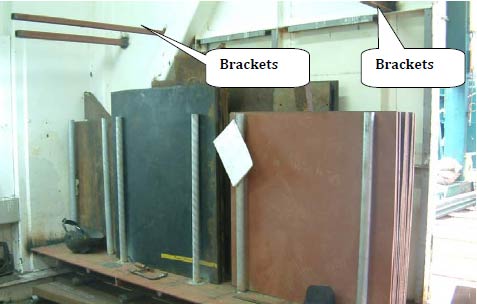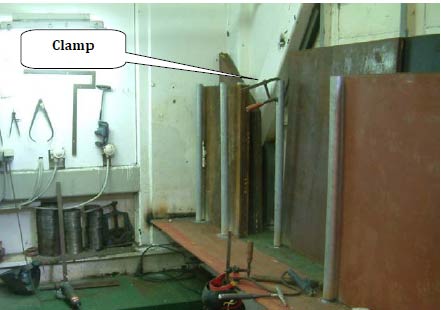Crewman injured when steel plates fell against him
A member has reported an incident in which a crewman was injured by steel plates falling whilst being placed in storage. The incident happened on a vessel when four crew members were moving steel plates (each weighing 250 kg) from the bosun’s store to the welding shop. Their intent was to create a new storage area in the welding shop for these steel plates. The new storage area was to be at a slight elevation of approximately 75 cm off the deck.
The plates were moved by overhead hoisting equipment from the bosun’s store to the welding shop. Because there were some brackets welded on the bulkhead, the steel plates had to be pushed into place manually once they were lifted onto the elevated storage area. Because several plates were to be stored in the storage area they were temporarily secured with clamps. When all plates were in their final position, steel poles were welded on the deck to secure them in place.
During the job a securing clamp was inadvertently knocked off while crew members manually moved one of the plates into its final position. As a result the plates fell over towards one of the crew members. He saw them coming, but owing to the weight of the plates he was unable to push them back and instead tried to jump out of the way. He was not successful; the plates came into contact with his body and he hit his head on a nearby column, resulting in small fractures to the skull and shoulder.


An investigation revealed the following:
- The job was considered ‘routine’ and no Job Hazard Analysis was conducted. Though the handling of steel plates is a ‘routine’ activity on board this vessel, the creation of a new storage area was not ‘routine’;
- Manual handling of steel plates weighing 250kg is inherently risky;
- A workplace inspection prior to the activity would have revealed the risks posed by the obstructing brackets on the bulkhead;
- The clamps used to secure the steel plates temporarily were not adequate or safe for the activity being conducted;
- There were too many people in too small a work space.
Safety Event
Published: 23 December 2011
Download: IMCA SF 14/11
IMCA Safety Flashes
Submit a Report
IMCA Safety Flashes summarise key safety matters and incidents, allowing lessons to be more easily learnt for the benefit of all. The effectiveness of the IMCA Safety Flash system depends on Members sharing information and so avoiding repeat incidents. Please consider adding [email protected] to your internal distribution list for safety alerts or manually submitting information on incidents you consider may be relevant. All information is anonymised or sanitised, as appropriate.
IMCA’s store terms and conditions (https://www.imca-int.com/legal-notices/terms/) apply to all downloads from IMCA’s website, including this document.
IMCA makes every effort to ensure the accuracy and reliability of the data contained in the documents it publishes, but IMCA shall not be liable for any guidance and/or recommendation and/or statement herein contained. The information contained in this document does not fulfil or replace any individual’s or Member's legal, regulatory or other duties or obligations in respect of their operations. Individuals and Members remain solely responsible for the safe, lawful and proper conduct of their operations.
